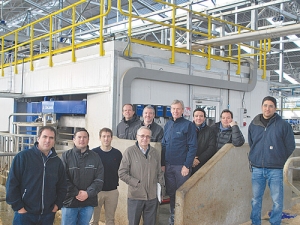NZ kiwifruit holding ground in global markets
The fight for global customers by fruit producers and marketers is on.
 Staff at Fundo El Risquillo, a large farm in Chile are eagerly awaiting the installation of 64 DeLaval VMS milking robots, making it the world’s largest robotic milking farm.
Staff at Fundo El Risquillo, a large farm in Chile are eagerly awaiting the installation of 64 DeLaval VMS milking robots, making it the world’s largest robotic milking farm.
A 6500-head dairy farm in Chile will become the world's largest robotic dairy after signing an agreement to install 64 DeLaval VMS milking robots.
The farm, owned by AgrÌcola Ancali and part of the Bethia Group, already has 16 DeLaval VMS installed and averages 45.2 litres for the 920 cows going through the robotic milking system.
Ancali AgrÌcola chief executive, Pedro Heller, says the expansion follows good results from first stage of the robotic dairy.
"We started using robots for 500 cows, and when we saw the economic benefits and we realised that it was possible to improve production per cow by 10% and reduce the stress of the cow so we decided to further explore," he says.
"During the second stage we decided to modify the farm, changing our conventional milking system for an automatic milking system.
"The plan is to have our best 4500 cows milked by DeLaval VMS and we believe we have a perfect set up should we decide to grow more in the future."
The farm also includes a ventilation system, cow cooling, rubber flooring, swinging cow brushes, water troughs and illumination.
When the new installation is complete, 4500 cows will be milked robotically while one rotary will remain for fresh and special needs cows. There are currently four rotaries in operation today.
The first DeLaval VMS installation took place with eight milking robots in October 2014. By early 2017, 64 DeLaval VMSs will be installed making the farm the largest robotic milking farm in the world.
The El Fundo Risquillo farm is located 500km south of Santiago and is part of a larger operation including a beef farming operation and a stud farm.
OPINION: Trade Minister Todd McClay and the trade negotiator in government have presented Kiwis with an amazing gift for 2026 - a long awaited and critical free trade deal with India.
Former Agriculture Minister Nathan Guy says he's excited about his new role as NZ's Special Agricultural Trade Envoy.
A pillar of New Zealand's horticultural industry, Dr Stuart Davis, was farewelled at a well-attended funeral service in Tuakau, South Auckland, on December 18.
A stable but uncertain year lies ahead for New Zealand primary products, says Ministry for Primary Industries (MPI) Director General, Ray Smith.
Additional tariffs introduced by the Chinese Government last month on beef imports should favour New Zealand farmers and exporters.
Dairy prices have jumped in the overnight Global Dairy Trade (GDT) auction, breaking a five-month negative streak.
President Donald Trump’s decision to impose tariffs on imports into the US is doing good things for global trade, according…
Seen a giant cheese roll rolling along Southland’s roads?